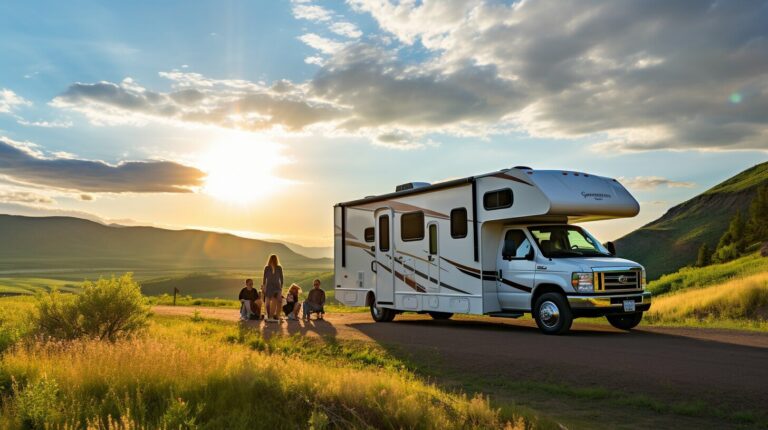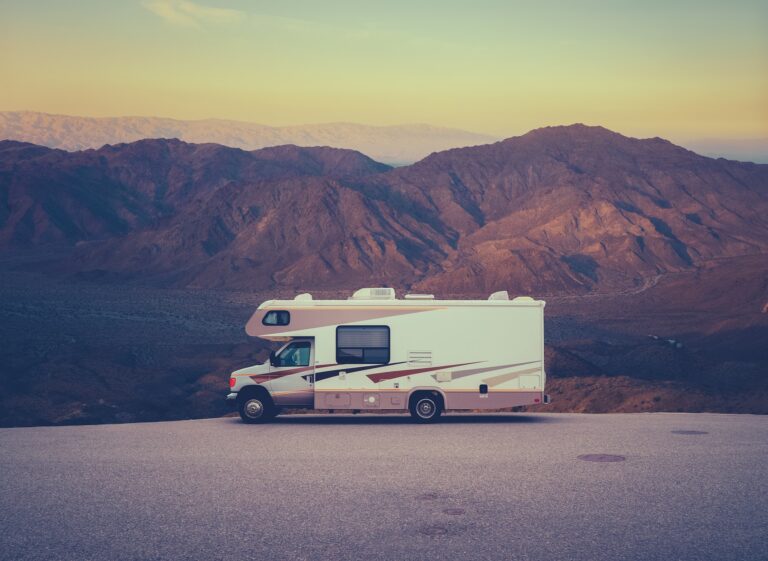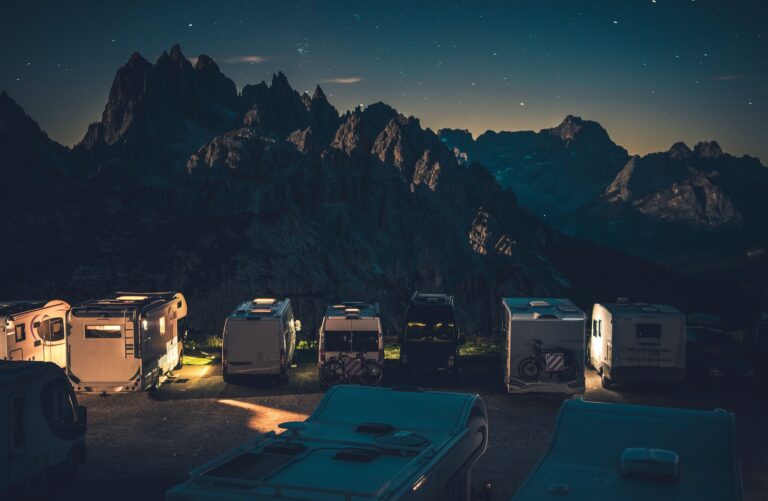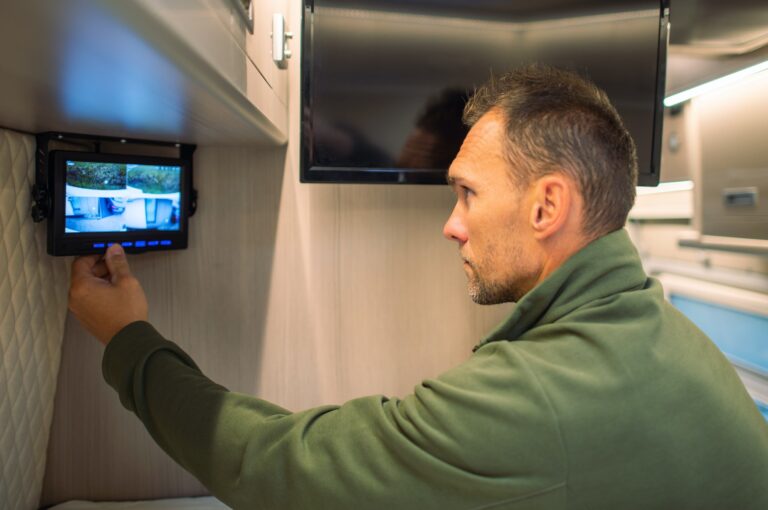Welcome to the ultimate guide for anyone considering the RV lifestyle! Whether you’re a seasoned RVer looking for some tips or a newbie just starting to explore this exciting way of life, this comprehensive guide is the perfect resource for you.
The RV lifestyle has become increasingly popular in recent years, and it’s easy to see why. With the freedom and flexibility to travel whenever and wherever you want, it’s no wonder that so many people are choosing to embrace the open road. And with so many different types of RVs and campsites available, there’s something for everyone.
What is the RV Lifestyle?
The RV lifestyle, also known as full-time RVing, involves living and traveling in an RV (recreational vehicle) full-time or for extended periods of time. It has become increasingly popular in recent years due to the freedom and flexibility it offers, allowing people to explore new places and meet new people while still enjoying the comforts of home.
There are many types of RVs available, from motorhomes to travel trailers to fifth-wheels, each with its own benefits and drawbacks. Motorhomes are self-contained, making them easy to drive and park, while travel trailers are lightweight and can be easily towed behind a vehicle. Fifth-wheels are larger and more spacious, but require a heavy-duty truck to tow.
People choose the RV lifestyle for a variety of reasons, including the desire to travel, explore new places, and experience new things. It also offers cost savings compared to traditional living arrangements, as RVers often spend less on housing, utilities, and other expenses.
What types of RVs are available?
As mentioned before, there are several types of RVs available, including:
| Type of RV | Pros | Cons |
|---|---|---|
| Motorhomes | Self-contained, easy to drive and park | Can be expensive, require maintenance and repairs |
| Travel trailers | Lightweight, can be easily towed behind a vehicle | May require a larger vehicle to tow, less living space |
| Fifth-wheels | Larger and more spacious, more amenities | Require a heavy-duty truck to tow, can be expensive |
Benefits of the RV Lifestyle
Living the RV lifestyle comes with a plethora of benefits. Here are just a few reasons why so many people are choosing to hit the road and embrace the RV lifestyle:
- Freedom and Flexibility: One of the biggest advantages of the RV lifestyle is the ability to travel anywhere, anytime, and for as long as you want. You can wake up one morning and decide to move on to the next destination, or stay put for as long as you like. The freedom and flexibility that comes with living on the road is unmatched.
- Cost Savings: Many RV enthusiasts choose this lifestyle to cut down on expenses. Living in an RV can be significantly cheaper than owning a traditional home, especially if you’re a full-time RVer. You have the freedom to choose your own campsites and can often find free or low-cost places to park your RV.
- Exploration: The RV lifestyle is perfect for those who love to explore new places and meet new people. With an RV, you can visit national parks, beaches, forests, and other scenic destinations that might be too far or expensive to reach via traditional travel methods.
- Minimalism: Living in an RV requires you to downsize your belongings to only what you need, which can be a refreshing change for those who are tired of accumulating material possessions. The minimalist lifestyle that comes with living in an RV can help you focus on what truly matters in life.
These are just a few of the many benefits of the RV lifestyle. Whether you’re considering full-time RVing, or just want to hit the road for a few months each year, the freedom and flexibility that comes with this lifestyle is truly unparalleled.
Choosing the Right RV
Choosing the right RV is a crucial aspect of the RV lifestyle, especially for those interested in full-time RVing. There are several types of RVs available, each with its pros and cons. Here are some factors to consider before choosing an RV:
| Type of RV | Pros | Cons |
|---|---|---|
| Class A Motorhome | – Spacious and luxurious – Provides a home-like feeling |
– Expensive – Difficult to maneuver |
| Class B Motorhome | – Convenient and easy to maneuver – Can be used as a daily driver |
– Limited living space – No separate bedroom |
| Class C Motorhome | – Offers a good balance of space and maneuverability – Provides a separate bedroom |
– Not as spacious as Class A motorhomes – Can be expensive |
| Travel Trailer | – Affordable – Easy to tow and maneuver (depending on size) |
– Requires a tow vehicle – Limited living space |
| Fifth Wheel Trailer | – Offers more living space than travel trailers – Provides a separate bedroom |
– Requires a pickup truck – More difficult to maneuver than travel trailers |
When choosing your RV, also consider the size, features, and cost. If you’re interested in full-time RVing, it’s important to choose an RV with enough living space and storage, as you’ll be spending a lot of time in it. Additionally, make sure to take a test drive before making a purchase to ensure that you’re comfortable driving and maneuvering the RV.
Planning Your Route
One of the most important aspects of the RV lifestyle is route planning. Taking the time to plan your trip can help you avoid traffic, find the best campsites, and discover hidden gems along the way. Here are some tips to help you plan your next RV adventure.
Use RV GPS Apps
There are many GPS apps available specifically designed for RVers. These apps take into account the size and weight of your RV and provide routes that avoid low bridges and narrow roads. Some popular apps include RV Trip Wizard, CoPilot GPS, and RV Parks & Campgrounds.
Research Campgrounds
Before you hit the road, research campgrounds along your route. There are many online resources available to help you find the best campgrounds, such as RV Park Reviews and Campendium. Look for campgrounds with good reviews, ample amenities, and convenient locations.
Consider Your RV’s Capabilities
| Road Type | RV Type | Considerations |
|---|---|---|
| Highways and interstates | Class A motorhomes, fifth wheels, travel trailers | Generally safe for all RV types, but be mindful of construction and heavy traffic. |
| Mountain roads and steep grades | Smaller Class C motorhomes, truck campers | Some mountain roads can be steep and windy, so make sure your RV is capable of handling the terrain. |
| Dirt and gravel roads | Off-road capable RVs | If you plan to take your RV off-road, make sure it is designed for rough terrain and has appropriate clearance. |
Stay Flexible
Even with the best planning, things can still go wrong. Construction, traffic, and weather can all impact your travel plans, and unexpected opportunities may arise. Don’t be afraid to deviate from your original plan and explore new destinations along the way.
By taking the time to plan your route, you can ensure a safe and enjoyable RV adventure. Whether you’re planning a long-term trip or a weekend getaway, these tips can help you make the most of your time on the road.
Essential RV Gear and Equipment
When hitting the road in your RV, it’s important to have the right gear and equipment to ensure your trip is safe, comfortable, and enjoyable. Here are some essential items to consider packing:
| Item | Description |
|---|---|
| Leveling Blocks | These help stabilize your RV on uneven ground. |
| Tire Pressure Monitoring System | These systems monitor your tire pressure and alert you to any issues. |
| Sewer Hose Kit | These kits allow you to safely and cleanly dump your RV’s waste. |
| Water Pressure Regulator | These regulate water pressure to prevent damage to your RV’s plumbing system. |
| Portable Air Compressor | These help keep your RV’s tires properly inflated. |
Other items to consider include a first aid kit, fire extinguisher, tool kit, and emergency road kit with flares and reflective triangles.
When packing gear and equipment, be sure to keep weight and space limitations in mind. Consider investing in lightweight and compact gear that is designed specifically for RV travel.
Maintaining Your RV
As a full-time or part-time RVer, maintaining your RV is essential to ensure that it stays in good condition while you’re on the road. Regular maintenance not only helps prevent breakdowns but can also help you save money in the long run by avoiding costly repairs.
Regular Inspections
It’s important to perform regular inspections of your RV, including checking the tires, brakes, and suspension. You should also check the roof for any signs of damage or leaks and inspect the RV’s electrical and plumbing systems.
Repairs
If you do notice any issues during your inspection, it’s important to address them as soon as possible. Don’t put off repairs, as they can quickly turn into more serious and costly problems. Some repairs, such as fixing a leaky roof or replacing a tire, may require the help of a professional.
Cleaning and Maintenance
Keeping your RV clean and well-maintained will also help prolong its lifespan. Regularly washing the exterior and maintaining the interior can help prevent damage from dirt, grime, and other debris. It’s important to use the appropriate cleaning products, and to avoid using harsh chemicals that could damage your RV.
Winterizing
If you plan to store your RV during the winter months, it’s important to properly winterize it to prevent damage from freezing temperatures. This may include draining the water system and adding antifreeze, as well as protecting the exterior from snow, ice, and other winter weather conditions.
Maintaining your RV is crucial to ensuring a safe and enjoyable experience on the road. By performing regular inspections, addressing repairs promptly, and keeping your RV clean and well-maintained, you can help prolong its lifespan and avoid costly repairs down the road.
Staying Connected on the Road
Staying connected while on the road is important for many RVers. Whether you need to work remotely, stay in touch with family and friends, or just keep up with your favorite shows, there are several ways to stay connected while on the road.
Internet Connectivity Options
One of the most important considerations for staying connected while on the road is internet connectivity. Many RVers choose to use a mobile hotspot, which allows you to connect to the internet using a cellular data plan. Another option is to use campground WiFi, which is available at many RV parks and campgrounds. However, keep in mind that campground WiFi can be slow and unreliable.
If you need a more reliable internet connection, you may want to consider a satellite internet system. These systems are more expensive than other options, but they provide a reliable connection no matter where you are.
Choosing a Mobile Carrier
When choosing a mobile carrier, consider coverage and cost. Depending on where you plan to travel, some carriers may provide better coverage than others. You should also compare the cost of different plans to find the one that best fits your budget and data needs.
Antennas and Boosters
If you’re having trouble getting a strong signal, you may want to consider using an antenna or booster. A cellular antenna can boost the strength of your signal, while a WiFi booster can help you pick up a weak WiFi signal and increase its strength.
Overall, staying connected on the road is essential for many RVers. By considering your internet connectivity options, choosing the right mobile carrier, and using antennas and boosters as needed, you can stay connected no matter where the road takes you.
Finding Campsites
One of the most exciting parts about living the RV lifestyle is the ability to travel around and explore new places. However, finding the perfect campsite can sometimes be a challenge. Here are some tips on how to find campsites while on the road:
1. Research and plan ahead
Before hitting the road, it’s always a good idea to research and plan your route. There are many online resources available to help you find the best campsites along your route. Some popular websites include Reserve America, Recreation.gov, and Campendium. These sites allow you to search for campsites based on location, amenities, and availability.
2. Consider different types of campsites
There are many different types of campsites available to RVers. Some popular options include state and national parks, private campgrounds, and RV resorts. Each type of campsite has its own unique characteristics and amenities, so it’s important to do your research and choose the one that best fits your needs.
3. Use apps to find campsites
There are many RV-specific apps available that can help you find campsites while on the road. Some popular options include AllStays, RV Parky, and RV Life. These apps allow you to search for campsites based on location, amenities, and reviews from other RVers.
4. Join RV clubs
Joining an RV club can be a great way to find campsites and connect with other RVers. Some popular RV clubs include Good Sam Club, Escapees, and Passport America. These clubs often offer discounts on campsites and other RV-related services.
5. Be flexible
Finally, it’s important to be flexible when it comes to finding campsites. Popular campsites can fill up quickly, especially during peak travel season. Having a backup plan or being willing to change your route can help ensure that you always have a place to park your RV.
Financial Considerations
Living the RV lifestyle can be a cost-effective way to travel and live on the road. However, it’s important to consider the financial implications before making the leap. Here are some financial factors to keep in mind:
- Cost of the RV: RVs come in a wide range of prices, from a few thousand dollars for a used RV to hundreds of thousands of dollars for a brand new luxury RV. Determine your budget before making a purchase and consider buying used to save money.
- Insurance: RV insurance can be more expensive than traditional car insurance. Be sure to shop around for the best rates and consider bundling your RV insurance with other policies for a discount.
- Fuel: Fuel costs can add up quickly, especially if you’re traveling long distances or driving a large RV. Plan your route to minimize your gas expenses and consider investing in a fuel-efficient RV if possible.
- Campsite fees: While there are some free campsites available, most campsites charge a fee. Research campsites ahead of time and look for discounts, such as weekly or monthly rates.
- Food and supplies: While it can be tempting to eat out at restaurants while traveling, cooking your own meals can save you a lot of money. Stock up on non-perishable items and shop at budget-friendly grocery stores along the way.
By considering these financial factors and making a budget, you can enjoy the RV lifestyle without breaking the bank. With careful planning and smart money management, the RV lifestyle can be an affordable and exciting way to explore the open road.
Living the RV Lifestyle
The RV lifestyle is all about freedom and flexibility. It allows you to travel and explore at your own pace, and to experience new adventures every day. But living on the road can also be challenging, especially if you’re new to the RV lifestyle. Here are some tips to help you make the most of your RV adventure:
Join RV Clubs and Communities
One of the best things about the RV lifestyle is the sense of community that comes with it. There are many RV clubs and communities that you can join, both online and offline. These groups can provide you with valuable information, support, and a sense of belonging. They can also help you find new friends who share your passion for travel and adventure.
Stay Safe on the Road
When you’re on the road, safety should always be your top priority. Make sure your RV is well-maintained and equipped with the latest safety features. Familiarize yourself with the rules of the road and the laws of the states you’re traveling through. Always lock your doors and windows when you’re not in your RV, and be aware of your surroundings.
Take Time to Relax and Recharge
Traveling can be exhausting, so it’s important to take time to relax and recharge. Take breaks when you need to, and don’t be afraid to spend a few days in one place if you need a break from driving. Make sure you have plenty of downtime to read, relax, and enjoy the scenery.
Be Prepared for Emergencies
When you’re living on the road, it’s important to be prepared for emergencies. Make sure you have a first aid kit, a fire extinguisher, and a tool kit in your RV. Keep a list of emergency phone numbers and contact information for your insurance company. And always have a backup plan in case something goes wrong.
Explore Your Surroundings
The RV lifestyle is all about exploring new places and experiencing new adventures. Take the time to explore your surroundings, whether that means visiting a national park, checking out a local museum, or trying out a new restaurant. Embrace new experiences and make the most of every moment.
Remember, the RV lifestyle is what you make of it. With a little planning and preparation, you can make the most of your RV adventure and create memories that will last a lifetime.
FAQ
Here are some common questions that people have about the RV lifestyle:
How much does it cost to live in an RV full-time?
The cost of living in an RV full-time can vary depending on your lifestyle. Some people live very frugally, while others spend more money on campgrounds, activities, and entertainment. However, living in an RV can generally be less expensive than living in a traditional home, as you won’t have mortgage or rent payments to worry about. You’ll also save money on utilities and other bills.
Do I need a special license to drive an RV?
Most RVs can be driven with a regular driver’s license. However, some larger RVs may require a commercial driver’s license (CDL). Check with your state’s DMV to find out the specific requirements for driving an RV in your area.
Is it safe to live in an RV full-time?
Yes, living in an RV can be safe as long as you take the necessary precautions. Make sure your RV is properly maintained and follow all safety guidelines when using appliances or operating your vehicle. It’s also important to be aware of your surroundings and keep your RV secure when you’re not there.
What should I do if my RV breaks down on the road?
If your RV breaks down on the road, stay calm and pull over to a safe location. Call your roadside assistance provider or a local RV repair service to get help. Make sure you have a basic tool kit, spare tire, and jumper cables on hand in case of an emergency.
Do I need RV insurance?
Yes, you’ll need to have insurance for your RV just as you would for a traditional home or car. RV insurance can provide coverage for accidents, theft, and other unforeseen events. Make sure you shop around to find the best insurance policy for your needs and budget.






